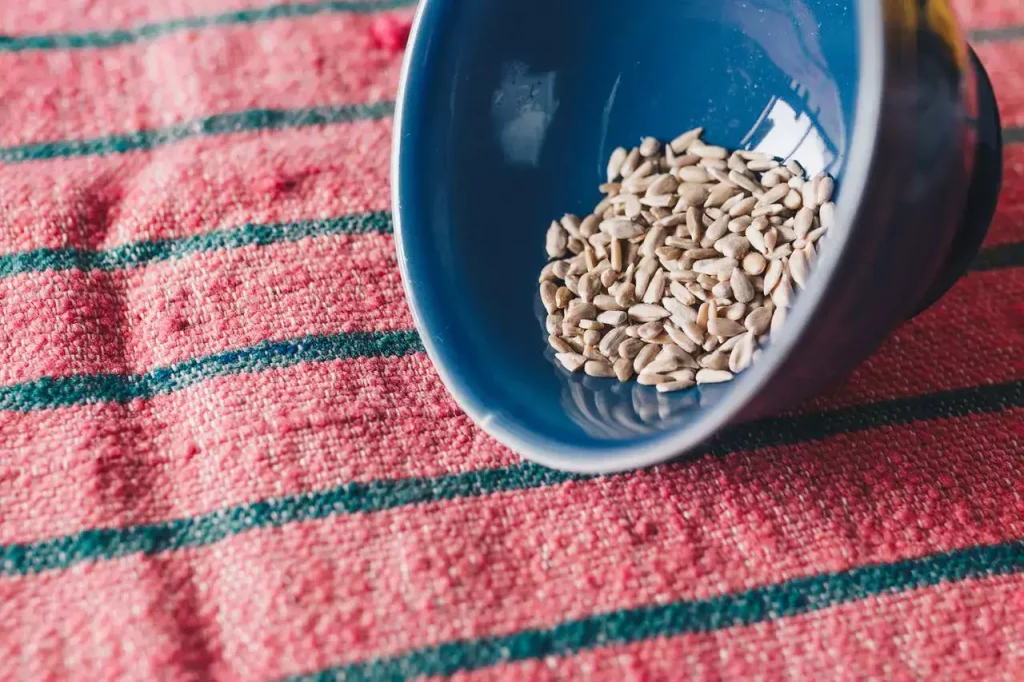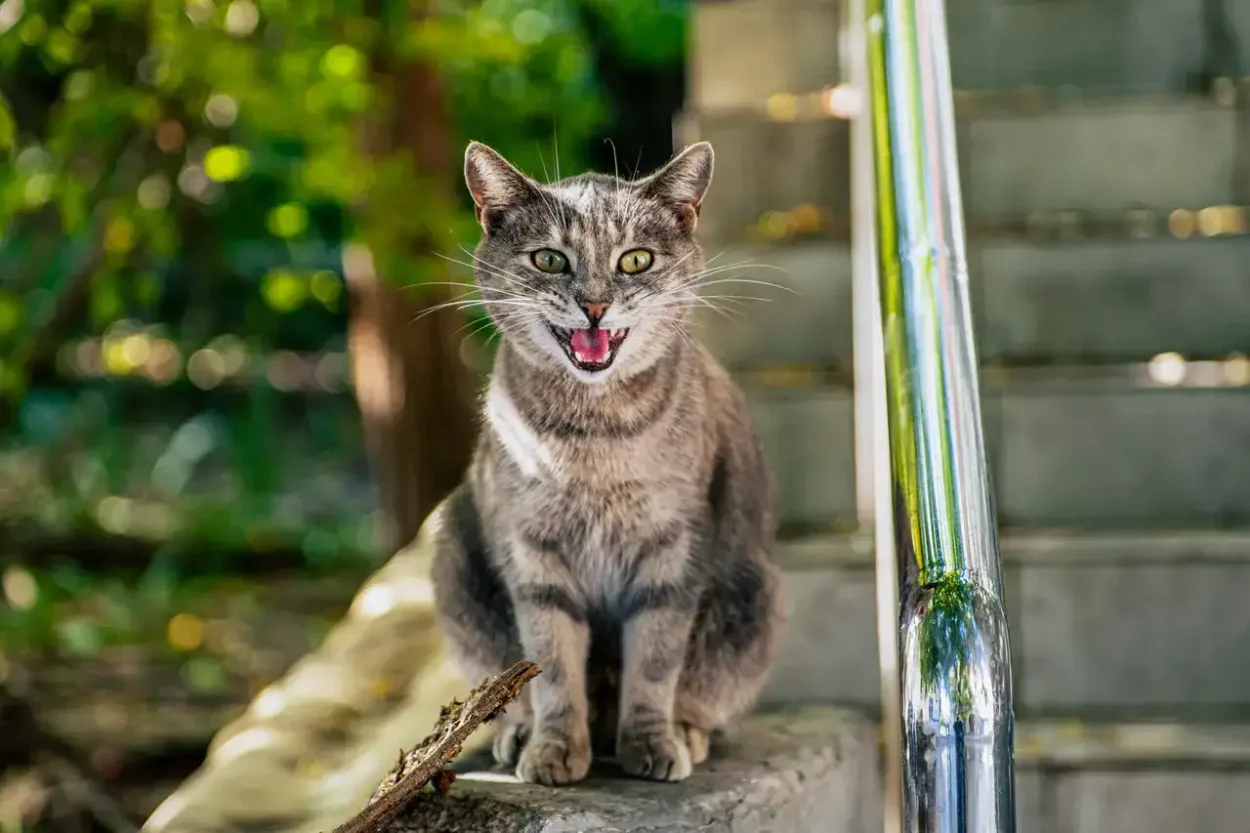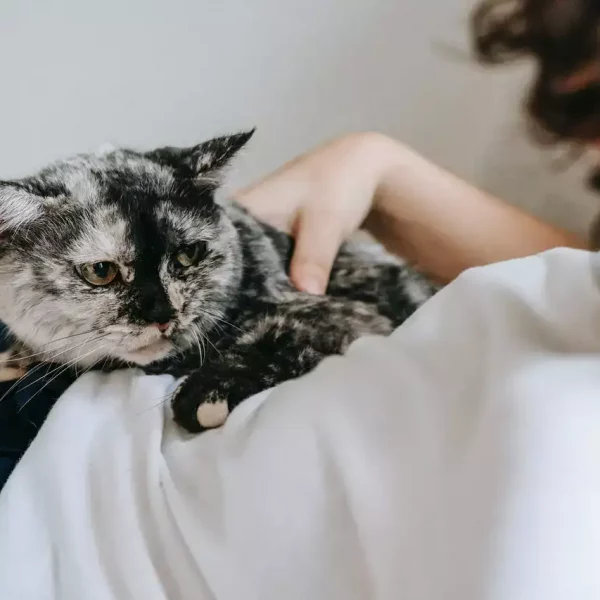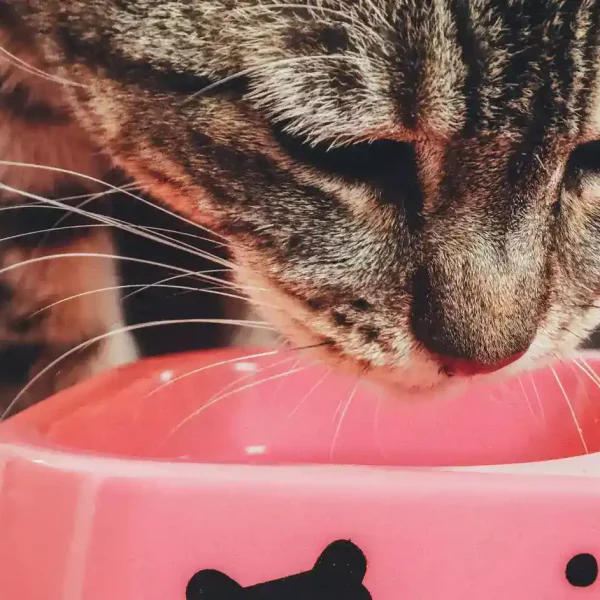My British Shorthair loves to gobble down any food that drops on the floor. Last week was a perfect case in point when my SO dropped some sunflower seeds from the table. Our cat ate the sunflower seeds with the shells on, which immediately made us panic thinking he would be ill.
Thankfully he was OK and suffered no bad reaction. But as I sound discovered, it could have been very different. I had spent some time researching into sunflower seeds being poisonous to cats, plus the risks of them eating the shells, kernels, or butter and oil derivatives.
Here’s what I found out…
Can cats have sunflower seeds? Whilst cats can eat sunflower seeds in moderation, owners should exercise caution. The sunflower seeds should be unsalted and peeled, possibly even ground up and added as a dusty treat over their main meal. They are not poisonous and could even have certain health benefits.

Whilst cats can eat sunflower seeds without the shell, whether they should be allowed to eat them is another discussion entirely… and that’s what I want to explore in more depth today.
Should you let your cat eat sunflower seeds?
Just like humans, cats all react differently to foods. If you are going to let them eat some of these seeds, make sure it’s a very small portion at first, perhaps just a couple on top of their normal food.
The sunflower seeds should be unsalted, peeled, and not have any other seasoning on them. Cats that consume high salt levels can suffer with sodium poisoning and dehydration, which is extremely serious… and the shells can also be dangerous (more on that later).
Disclaimer: I don’t know your cat, the history, or if it has any existing health conditions. Based on this, you need to ask your vet before you add anything to your kitten’s diet that wasn’t intended for them. For example, sunflower seeds have a high copper content. This could present liver problems, so please do check with a vet first before letting your cat eat some.
Are sunflower seeds poisonous to cats?
Sunflower seeds are not poisonous to cats, but you should not let them eat large quantities, or ever let them eat sunflower seeds with the shells on.
Whilst I cannot find any scientific references to sunflowers being toxic to cats, I was able to find some information on the LiveStrong.com website about the harm that can come to humans if sunflower seeds are eaten in excessive quantities:
“Overindulging in sunflower seeds could potentially cause problems with excessive intake of phosphorus, which may lead to calcification of non-skeletal tissues and kidney damage. Excessive intake of selenium might cause symptoms of selenosis, including brittle hair and nails, skin rashes, fatigue and irritability, and even death.”
I am going out on a limb here, but I would assume that similar dangers would present themselves to cats if they ate huge quantities of sunflower seeds each day.
Can cats eat sunflower seed shells?
If you do decide to let your cat eat sunflower seeds, please do remove the hard-outer shells first or purchase seedless varieties.
Whilst cats can eat sunflower seed kernels in moderation, the shells should be avoided. Unlike other animals such as rodents and birds, cats have no way of de-shelling seeds.
And this can become a problem, because the shells are rough in texture and not easy for your cat’s digestive system to break down. This could lead to serious gastrointestinal problems, and certainly diarrhea.
When we eat a sunflower seed, we can quickly chew the shell and then spit it out. Cats don’t have that luxury meaning the shells can choke them, get stuck internally, and lead to stomach upsets.
What happens if a cat eats sunflower seeds?
The results will entirely on the volume they eat, the way the seeds are prepared, and whether shells are still on.
For example, if your cat eats a whole bag of sunflower seeds, I can’t imagine the outcome will be a pretty one. It could lead to vomiting, diarrhea, and possibly even choking.
Be very strict on how much your feed your cat, ensuring to not exceed a tablespoon of shelled sunflower seeds in any one portion.
The potential health benefits of sunflower seeds
In moderation, sunflower seeds could offer some health benefits to your cat. I don’t believe you should suddenly rush out and start adding seeds to your cat’s diet, but here’s what the potential positives are according to medical research I found online.
- Can lead to reduced inflammation and disease risks (source: Columbia University).
- Can boost heart health with lowered heart disease (source: Harvard University).
- Can boost the immune system with high levels of essential minerals and vitamins.
Bear in mind, the studies referenced above were conducted on humans and not cats. There are no real comparable studies relating to felines and sunflower seed consumption other than this research which looked at how the seeds can benefit cats’ skin and hair:
“It was concluded that a 1-month supplementation with either flax seed or sunflower seed in cats provides temporary improvement in skin and hair coat. These changes appeared to be associated with increased serum 18 carbon PUFA.”
The best way to add sunflower seeds to a cat’s diet
If I was going to let my cat eat sunflower seeds, I would personally grind them up without the shells, and make sure there was no salt present. Before I even did that, I would also wash away any impurities that could be covering the seeds.
I would then sprinkle a small amount on their food or add it as a ground up powder – kind of like a supplement.
There are some cat-friendly sunflower seed recipes online. One of the best I found was this homemade sunflower cat treat recipe. I’ve not tried these with my own cat, but the person who came up with this idea said:
“I’ve started making my own cat food, and these are the perfect little treats! Whole grain cookies with flax seeds and sunflower seeds will make your cat pay attention!”
Be strict on portions though as according to Healthline.com, there are 204 calories in a quarter of a cup of sunflower seeds. That’s not a lot of seeds, but it is a lot of calories, can equate to up to 32% of a small to medium sized cat’s recommended daily intake.
It would not take too many weeks of letting your cat eat sunflower seeds in reasonable quantities for them to start putting weight on – so just bear this in mind.
Can cats eat sunflower seed butter?
Cats can eat sunflower seed butter, but, and it’s a BIG but… make sure it is in moderation only. Sunflower seed butter should be considered as a snack and treat due to the high calories counts and fat.
When it comes to snacks, I follow one very simple rule with my cat; the 90/10 rule. It’s simple to follow, and just means that anything that counts as a snack should only account for 10% of his daily calories.

It’s healthier that way for sure.
In fact, many cat owners will use sunflower seed butter as an alternative to peanut butter. Many commercially available peanut butters contain xylitol, which is very toxic for cats, and also found in candy and mints.
Handy Hint: Some mints and gums contain so much xylitol that could be kill your cat. Read more about how the popular Tic Tacs could be a problem for felines.
The calorie considerations
Looking at it closer, if you consider that cats should only really be eating 25 calories for every pound they weigh each day, then the numbers can soon stack up with sunflower seed butter.
I’ve crunched the numbers on it by taking two common cat breeds and what their average weights are. This has let me calculate what percentage of their daily intake a portion of branded sunflower seed butter could be, using some popular brands.
- Average Maine Coon is 15 pounds: no more than 425 daily calories.
By then taking the three best selling sunflower seed butters on Amazon, and then looking at how many calories were listed in a serving, you see this:
- SunButter (200 calories per serving): 32% Maine Coon daily calories / 11% Labrador daily calories.
- Once Again (210 calories per serving): 34% Maine Coon daily calories / 12% Labrador daily calories.
- Bliss (200 calories per serving): 32% Maine coon daily calories / 11% Labrador daily calories.
As you can see, for a smaller breed, just one serving could take up around a third of what they should be having each day, based on the 90/10 rule.
To conclude, cats can eat sunflower seed butter but please keep the portion to a small one.
Can cats eat sunflower seed oil?
Sunflower oil is made by squeezing sunflower seeds to a pulp, with the resulting plant-based oil being rich in fatty acids. On a positive note, sunflower seed oil is low in saturated fats and will often be added to commercial cat food in small quantities to provide omega-6 fatty acids into your cat’s diet.
Handy Hint: We will often put a little sunflower seed oil on our cat’s nose when it gets dry and cracked. You can also use it on cat paws when they dry out in the summer months.
Omega-6 fatty acids are said to contribute toward the health of your cat, with the benefits of soft and shiny fur plus a health immune system being commonly referenced online.
Based on this, cats can eat sunflower seed oil, but it’s not something I would manually add to their food yourself in higher quantities.
The reason being, in large amounts, sunflower oil will put too much omega 6 into your cat’s system. This is said to lead to increased inflammation, possibly leading to a higher risk of cancer according to Dr Dressler from Exclusively Cats Veterinary Hospital.
“Too much omega 6 and not enough omega 3, and bad things happen. These bad things are not minor, folks. Excessive intake of omega 6 fatty acids suppresses cells that are key in the body’s natural cancer-fighting ability (Natural Killer cells and cytotoxic T cells). The omega 6 group promotes inflammation, which is critical in cancer development.”
What’s the alternative?
If your cat has a deficiency in omega-3s and 6s and need to boost their fur and skin health, rather than them eating or drinking sunflower seed oil, give them a single oil supplement.
There are plenty of them on the market, but they current best in my opinion would be fish oils for cats with omega 3s and 6s.
Conclusion
As with any non-cat recommended food, the main consideration is common sense and moderation.
There are plenty of online guides that say sunflower seeds are okay for cats to eat. Whilst I share this sentiment, I am not going to start supplementing my cat’s diet with sunflower seeds every day.
Why?
All cats are different, so as with anything like this, you should always ask your vet first. Your cat might have pre-existing health conditions that make seeds a very bad choice for them or they simply might react badly with an allergy.
Play it safe, take the shell off, let them try one, and go from there.
Ultimately tough, there are plenty of healthy cat treats out there that have been manufactured for cat’s in consultation with vets.
Based on this, there really is no need to let your cat eat sunflower seeds unless you are going down the raw diet route.



Leave a Comment